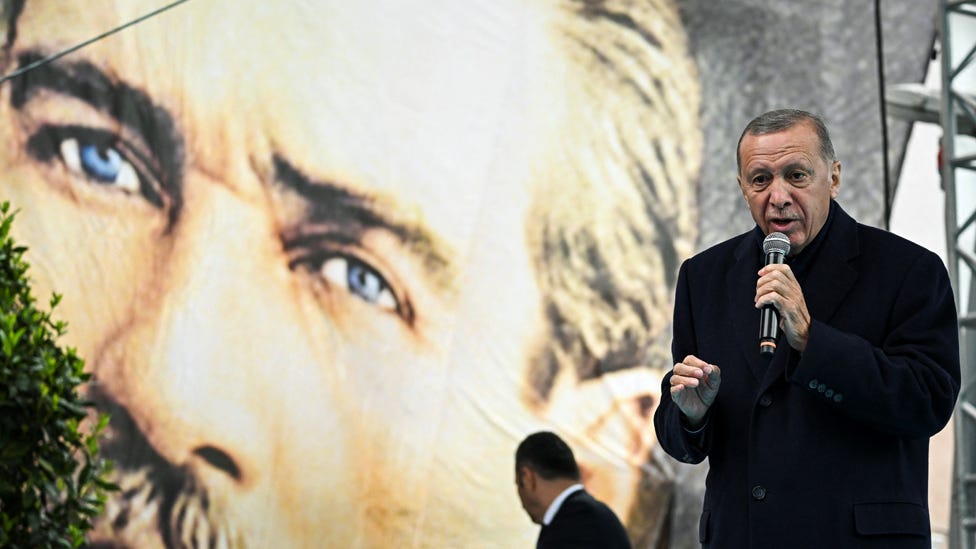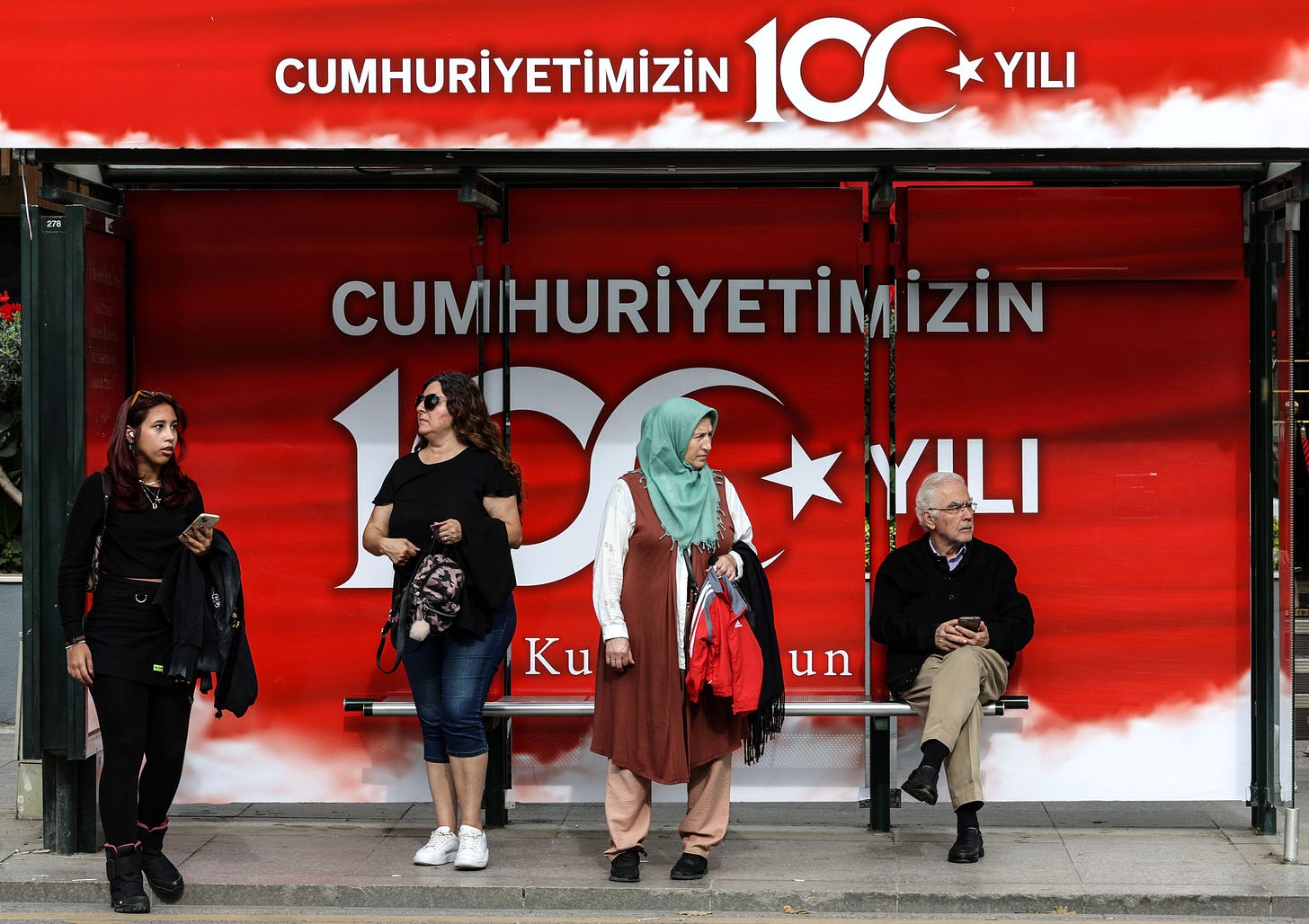On its centenary, has Turkey come full circle?
Mustafa Kemal Ataturk’s western facing, avowedly secular nation state has been reshaped by another strongman, its longest serving president Recep Tayyip Erdogan.
By Firdevs Robinson.
On October 29, 2023, Turkey is marking the 100th birthday of its republic. As the country enters its second century, Mustafa Kemal Ataturk’s western facing, avowedly secular nation state has been reshaped by another strongman, its longest serving president Recep Tayyip Erdogan.
In a deeply polarized modern Turkey, the big celebration is not a joyful one. A day after a massive rally in Istanbul to condemn Israelis and to support Palestinians over the Gaza war, Sunday’s anniversary will be nothing like the earlier boisterous 50th and the 75th year celebrations.
While the secular opponents of the ruling party bemoan lack of recognition for this important milestone in their history, country’s conservative religious citizens see it as an unhappy anniversary, a dark day marking the demise of their “great empire”.
Death of an empire, it indeed was.
A major power during the 17th century, Ottoman state was already disintegrating by the 19th century. It was referred to as the “sick man of Europe”, a phrase coined by Tsar Nicholas I.
A mighty empire straddling three continents no more, the Ottoman Empire emerged from World War I defeated, partitioned, and occupied.
After a four-year long Turkish War of Independence, led by nationalist forces, the Ottoman Sultanate was abolished on 1 November 1922.
“Mustafa Kemal had fought in defence of the Ottoman Empire until it became indefensible, and he inherited the skills and realism of imperial administrators”.
The Treaty of Lausanne, signed on 24 July 1923 is the founding document of the Turkish national state, making peace with Allies and Greece as well as defining the frontiers of modern Turkey.
On 29 October 1923, the Turkish Republic was proclaimed. The Grand National Assembly elected Mustafa Kemal as the first president of the Republic.
According to late Andrew Mango, a former BBC journalist and author of a major biography of Ataturk, “Mustafa Kemal had fought in defence of the Ottoman Empire until it became indefensible, and he inherited the skills and realism of imperial administrators”.
That meant “top to bottom reform, based on modernisation, liberation and liberalisation”.
Abolition of the Khalifate in 1924 was more difficult and controversial than abolishing the Sultanate in 1922.
Laying foundations of Turkey, Mustafa Kemal’s vision was a knowledge-based western modernization. The Swiss Civil Code, the Italian Penal Code and German Commercial Law were introduced. Muslim calendar was exchanged with the European one.
Latin alphabet replaced the Arabic script. In 1934, a surname law was introduced. The Grand National Assembly gave Mustafa Kemal the surname Ataturk, the “father of Turks”.
Turks were no longer subjects. They were equal citizens. Turkish women were given the right to elect and to be elected in 1934, much earlier than some European countries.
“Peace at home, peace in the world” became the principal of Turkey’s foreign policy but on the 10th anniversary of the Republic, Hitler came to power in Germany. By the time Ataturk died on 10 November 1938, the world was moving towards another major turmoil.
Ataturk’s time was one-man rule. It was not a democracy. In building a nation state, ethnic diversity was suppressed. The Greek-Turkish Exchange of Populations in 1923 forcibly relocated one and half million people. The Kurdish uprisings in the early years of the Republic were suppressed with brute force.
Could a cultural and political revolution taking place in a young nation state emerging from the ruins of a multinational, multicultural empire have happened in any other way, at that time? It is a question still hotly debated in today’s Turkey.
The journey that started a century ago with a series of radical reforms is continuing with another set of top-down reforms today, led by another strongman.
Yet, President Recep Tayyip Erdogan’s vision of the second Turkish century and his way of building a long-lasting legacy could not be more different.
Ataturk’s determination to exclude religion from the public domain had led to strong secular institutions. President Erdogan, the most powerful and successful leader since Ataturk has managed to reverse that.
Turkey’s Religious Affairs Directorate has become a very powerful and well-resourced player in Turkey’s political and social life. Islamic brotherhoods’ influence grew, giving them a greater political and economic influence. The decision to pull out of the Istanbul Convention is seen as a major reversal of women’s civil rights.
Dubbed a “latter-day Sultan” by his critics and “reis” or chief, not only of Turkey but the wider Islamic world by his loyal supporters, Erdogan is determined to leave even a bigger mark.
His party faithful is claiming they have done more in the last 20 years than was done in 100 years.
Some ruling party politicians described the republican era as a “parenthesis” in the past.
No wonder the official poster marking the centennial celebrations came out with the words:
“3000 years of State, 100 years of Republic”.
Firdevs Robinson is a London based freelance journalist and commentator.
Read the Russian version of this story here.







